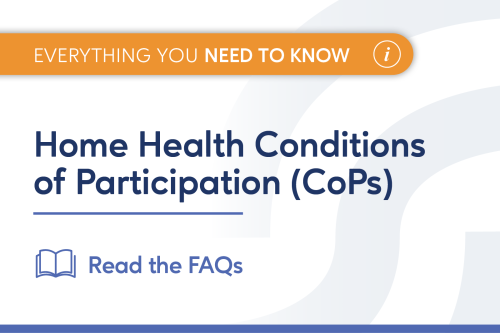Welcome to our comprehensive FAQ guide based on the recent webinar, "Mastering the New Home Health Conditions of Participation: Strategies for Compliance and Enhanced Patient Care," presented by SimiTree's J’non Griffin, SVP of Compliance and Coding.
In this post, we'll cover key questions and answers from the webinar, providing valuable insights into understanding the updated CoPs and strategies for achieving compliance. Read on to learn more, and watch the recording, linked below, for in-depth information. Don't forget to sign up for a consultation to get personalized assistance for your agency's compliance needs.
Understanding Home Health Conditions of Participation: All about CoPs
Here are the questions we received during our recent webinar, “Mastering the New Home Health Conditions of Participation: Strategies for Compliance and Enhanced Patient Care.” In case you were unaware, SimiTree offers complimentary webinars multiple times a month to cover the top trending industry topics. Join our email list by filling out a form today to never miss a free webinar again.
Want to watch this webinar on demand? We've uploaded the entire session to our webinars page under "Compliance" for your convenience.
CoPs FAQs:
Q: If you are certified with Medicare, are you required also to service straight Medicaid patients in your state?
A: That would be state-specific, but I believe there must be some Medicaid patients taken because it is funded by CMS. It does not have to be all referrals that are Medicaid
Q: Regarding verbal consent prior to patient care, is verbal consent enough? Can the information be sent then, and provided to the patient legal rep in electronic form?
A: The CoPS are straightforward in that we must have the patient's rights and signature before any hands-on care or education is provided to the patient.
Q: If the consent and patient write forms are different forms, does the patient rights form also need to be signed?
A: Yes, there must be evidence you provided it, and that's the easiest way to have evidence or written documentation provided to the patient before hands-on or education to the patient.
Q: How long after an oasis is completed can it be exported?
A: You only have a timely filing, so if it's associated with payment, you only have 12 months to go back and fix that. Otherwise, the regulation for corrections are noted here: https://www.cms.gov/Medicare/Quality-Initiatives-Patient-Assessment-Instruments/HomeHealthQualityInits/Downloads/Home-Health-QRP-Submission-Correction-Policy-June-2019.pdf
Q: Are dates and onset exact requirements for all diagnoses on the plan of care?
A: No, dates are not required on diagnosis and neither are onset or exacerbation identified. Some software requires this as part of their software, but it is not required by CMS. Surveyors do say that if you have a date of exacerbation or onset, then you should have documentation of that onset or exacerbation in the medical record.
Q: Is the agency required to provide written materials to the patient?
A: They must have some way of documenting the education that was provided; it is recommended they have educational material in the patient’s preferred language.
Q: Do all disciplines ordered at the referral have to be on the consent?
A: If the consent is part of the piece that has the patient's financial responsibility, then yes.
Q: Can you clarify when an O.T. can start care?
A: OT cannot stand alone on admission for government-funded payers, so other therapies must be identified on the referral. If nursing is ordered on the referral, then a nurse must do the admission.
Q: Do surveyors use the nurse narrative to collaborate with the primary diagnosis concerning the patient's skilled need?
A: I would say yes, that is going to substantiate your primary reason for home care.
Q: Is a visit by a PT after the OT considered the initial assessment?
A: The OT can do the admission, and the PT can go and do the second visit. The PT doesn't have to do the admission to establish eligibility. This visit must occur in the 5-day assessment time frame for a SOC.
How SimiTree Can Help
At SimiTree, we understand the complexities of compliance and regulatory risks in the home health industry. Our team of experts specializes in healthcare compliance and regulatory risk services, offering comprehensive solutions to ensure your agency meets all requirements and standards. From policy development to staff training, we provide tailored strategies to enhance compliance and mitigate risks.
Additionally, our home health consulting services are designed to support agencies in optimizing their operations and delivering high-quality care. Whether you need assistance with CoPs compliance, clinical documentation, or workflow optimization, our experienced consultants are here to help. Partner with SimiTree to navigate regulatory challenges effectively and elevate your agency's performance.
For more information about our compliance and regulatory risk services, visit here. To learn more about our home health consulting services, click here.

